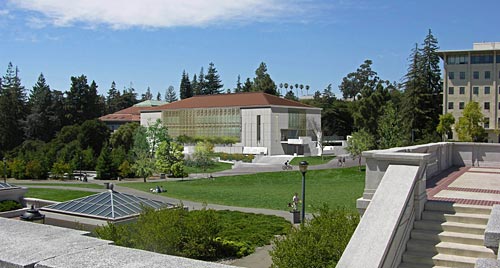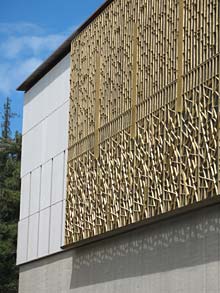UC Berkeley Web Feature
 The C.V. Starr East Asian Library graces Observatory Hill, across Memorial Glade from Doe Library. (UC Berkeley Capital Projects rendering) |
UC Berkeley to dedicate new state-of-the-art C.V. Starr East Asian Library on Oct. 20
BERKELEY – Scholars and donors from around the world will gather at the University of California, Berkeley, on Saturday, Oct. 20, for private ceremonies to dedicate the C.V. Starr East Asian Library, the first freestanding library in the United States constructed exclusively for an East Asian collection and one of the few such facilities in the world.
| Library highlights |
|
|
The new library's treasures – among them more than 900,000 volumes of primarily Chinese, Japanese and Korean materials including woodblock prints, rare maps and scrolls, contemporary political posters and Buddhist scriptures – will begin an elaborate move into their state-of-the-art, four-story, granite and concrete home in the weeks following the dedication. These objects have long been scattered across campus, often stored in less than ideal conditions.
The library bears the C.V. Starr name in honor of the late Cornelius Vander Starr, a UC Berkeley undergraduate and an American International Group Inc. (AIG) insurance pioneer with a deep interest in Asia.
Scheduled to formally open its doors in early 2008, the facility occupies a prominent, central campus location next to Memorial Glade and Doe Library, reflecting UC Berkeley's role for well over a century as a worldwide, Pacific Rim hub for students and researchers of East Asian studies.
"The magnificent new C.V. Starr East Asian Library represents UC Berkeley's excellent leadership and commitment to East Asian studies historically and into the future," said UC Berkeley Chancellor Robert Birgeneau. "This splendid research and learning center will be an enduring symbol of UC Berkeley's geographic and cultural position at the crossroads of East and West."
A repository of knowledge and scholarship dating back more than 2,000 years, the new library will aid in the education of students and scholars for generations to come, said Peter Zhou, the library's director.
The 68,000-gross-square-foot library, approved by the UC Regents at a capital improvement project budget of $46.4 million, was designed by internationally acclaimed Tod Williams Billie Tsien Architects and built with the contracting assistance of McCarthy Building Companies Inc. The C.V. Starr Foundation made a cornerstone gift of $8 million to the new library that was pivotal in the project's fundraising success. The project also received significant support from a group of donors who collectively contributed in excess of $6 million to honor former UC Berkeley Chancellor Chang-Lin Tien, a distinguished engineer and scholar who in 1990 became the first Asian American chancellor of a major U.S. research university. He died in 2002.
Financed entirely with private contributions from more than 1,000 donors – many of them Asian American – gifts came in the range of a $5 bill to $8 million. Eleven donors each contributed more than $1 million.
"We are pleased to help create this beautiful, new, state-of-the-art facility to hold Berkeley's important collection of East Asian materials," said Maurice R. Greenberg, chair of The Starr Foundation. "Our beginnings were in Asia, and one of our missions is to improve understanding and foster cooperation between Asia and the United States. This library is a continuation of those efforts."
 Large bronze screens, cast in China, adorn three sides of the East Asian Library. (Jonathan Reo photo) |
The library's stunning design includes large bronze screens, cast in China, that adorn three sides of the building's exterior. Inside, a ceiling skylight distributes soft light throughout the structure and down a hanging staircase that stretches from the top to bottom floors. A stunning and airy reading room overlooks Observatory Hill. A large window on the second floor offers a view of a small pool of round river stones on an outside rooftop.
A large number of visitors is anticipated at the library, which will offer more than just a new home for books and documents.
The facility will be a "knowledge hub to support scholastic research, exchanges of ideas and discoveries of new insights. It will become a key conduit where the East and the West converge," said Coleman Fung, a UC Berkeley alumnus and the CEO and founder of Open Link Financial Inc. He donated $5 million for the new library's Coleman Fung Media Center, which will have links to public and private databases in Japan, Korea and China that relate to the humanities and social sciences.
"It is critical that Berkeley furthers its mission by providing such a constraint-free conduit where cultural gaps can be turned into educational opportunities and bridged accordingly," he said.
Patricia Berger, chair of UC Berkeley's Department of Art History, said faculty members are excited about the new art history seminar room with state-of-the-art projection capabilities and easy access to large-size books in the collection.
The East Asian Library's art history collection has been housed in recent years in the basement of California Hall, which is inaccessible in the evenings and on weekends, she said.
The new library's Henry Fong Rare Book Room contains a rare book vault, with temperature and humidity controls and modern security measures that were lacking in the library's previous homes.
In the 1980s, UC Berkeley faculty working in fields relating to East Asia initiated the push for a new East Asian library, as campus facilities had inadequate space and conditions for the collections, said David Johnson, a UC Berkeley history professor who specializes in Chinese popular culture.
He praised the new East Asian Library as a symbol of UC Berkeley's stepped-up commitment to East Asian studies. "We've had one of the world's greatest collections on China, Japan and Korea in buildings sadly inadequate for its ongoing storage and care," Johnson said.
"The fundamental thing is that we will have crucial pieces of our collection all together in one place," he said of the new library.
Every year, more than 70 UC Berkeley scholars teach over 200 courses concerning East Asia, and UC Berkeley's programs in East Asian studies have been ranked first in the nation by the U.S. Department of Education.
More than 5,500 undergraduate and graduate students take East Asian-related courses a year. More than 300 undergraduates earn degrees each year in areas involving East Asian scholarship, and UC Berkeley awards the most doctorates nationwide to students specializing in East Asia. Nearly 700 visiting Asian faculty and scholars are hosted by UC Berkeley at any given time.
Roughly 3,000 students enroll in UC Berkeley's East Asian Languages and Cultures Department programs each year, and UC Berkeley is one of the few institutions in the United States to offer five years of Chinese, Japanese, and Korean language study.
In addition, the campus has international exchange agreements with a dozen institutions in Asia.
"When I graduate in spring 2008, the hardest part of leaving Berkeley will be saying farewell to the East Asian Library," said Janice Kanemitsu, a Ph.D. candidate in Japanese studies who is researching Japan's early modern period (1600-1868). "It is absolutely one of the top two libraries in the country for my field, both in primary texts and secondary scholarship."
"Not only does it have a vast collection of Japanese-language secondary scholarship in my field of specialization, I can also hold in my hands and read the very same books as readers of the Tokugawa period," she said. "Outside of Japan, perhaps only the Harvard-Yenching library (at Harvard University) has a larger collection of Tokugawa-period woodblock-printed books."
The library also holds the Murakami Collection of first-edition literary publications from the Meiji (1868-1912) and Taisho (1912-1926) periods. "Reading a modern, annotated edition of a text is crucial, but there is something extremely magical about books from another era – they're also like time machines," said Kanemitsu.
Pauline Yu, a scholar of classical Chinese poetry who has used UC Berkeley's East Asian collection for her research, will participate in dedication events this week for the new library. She said the library will attract scholars from around the world and be a model for other universities.
"UC Berkeley has provided a stirring example of how the sustained effort of a university's leadership, librarians and faculty can engage philanthropists, foundations and corporations to create a resource of global significance," said Yu, president of the American Council of Learned Societies.
Leslie Tang Schilling, a UC Berkeley alumna and a UC regent, said she contributed financially to the library because China, specifically, and Asia, in general, will be a world force in this century.
"Our population knows very little about that part of the world and so we need to prepare ourselves by understanding the culture and history of Asia," she said.
This week, programs will be held on campus in celebration of the library's dedication and East Asian studies at UC Berkeley. An outline of events — including programs on East Asian library collections and digitization, Buddhism studies and Chinese opera and ballet — is available online.


